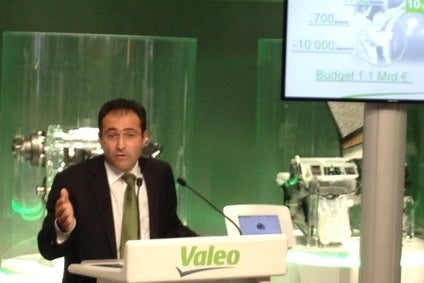
Increasing focus on autonomous driving potential will require a combination of several partners to solve technological and human behavioural issues, says French supplier, Valeo.
Self-driving vehicles are increasingly becoming the focus of component makers and OEMs, but will have to fit into an as-yet undefined set of rules common to manufacturers and countries.

Discover B2B Marketing That Performs
Combine business intelligence and editorial excellence to reach engaged professionals across 36 leading media platforms.
“What we need is to combine infrastructure providers, which are not OEMs and Tier 1s…with legislation – this is a big effort,” Valeo Group SVP R&D and product marketing, Jean-Francois Tarabbia, told just-auto on the sidelines of the Paris Motor Show.
“We try to combine these three parts, infrastructure, legislation and governments and automotive companies to find solutions.”
Tarabbia highlighted various levels of current regulations such as the Vienna Convention on Road Traffic, which insists a driver even with an autonomous vehicle, must always be in control, while national highway code standards would also need to be modified.
The need for clarity surrounding autonomous driving can be gleaned from just one country – the UK – which has signed the Vienna Convention but not ratified it.
According to the British Parliamentary Office of Science and Technology, as of September last year, there was no published strategy for the adoption of autonomous vehicles in the UK.
The Office said Innovate UK – formerly the Technology Strategy Board – noted this lack of guidance was hampering technological progress but added the Department for Transport (DfT) was commissioning a scoping study to look at barriers to implementation.
“But if you change the Vienna Convention, where is the limit,” said Tarabbia. “The automotive industry has to adapt to what is reasonable and what makes sense.
“The challenge we have is if your car can drive autonomously in some cases and not in other cases, you must master very well the transition. We need to understand the human behaviour.”
Valeo was also showcasing its technological innovations at the Paris Show, including the InBlue smartphone-compatible key to lock, unlock and start cars remotely, with the facility equally allowing car sharing permitting motorists to send a digital key to a person of their choice.






